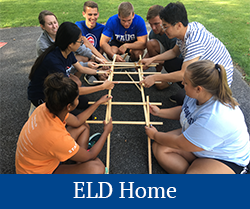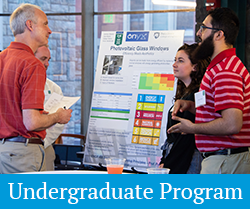
Engineering Leadership Development Minor Courses
The ELD Minor is an 18-credit minor structured to allow customization based on student career goals and interests. Students interested in the ELD minor should work closely with their academic adviser within their degree program to determine which courses will count toward engineering electives or professional electives.
The list on this webpage showcases the required courses to complete the minor. Minor courses may not automatically fulfill minor requirements on your degree audit and will need to be corrected by the program. If you are getting close to graduation and would like to confirm that you have fulfilled all requirements, please email engrleadership@engr.psu.edu.
Required Courses
ENGR 407: Technology-Based Entrepreneurship
3 credits (fall and spring)
Students learn about business and entrepreneurship through risk-taking, creativity, and innovation. This course helps students recognize their own ability to lead a team and move a product from idea to market through many challenging and exciting projects. The course is designed to increase students' team-working abilities, as well as leadership competencies.
ENGR 408: Leadership Principles
3 credits (fall, spring, and online in fall, spring, and summer)
Students learn about leadership concepts, principles, and theories through discussions, projects, and readings. Enrollment in this course allows you to enroll in the ELD minor in LionPath, which will grant you eligibility to take our remaining courses. Online sections of ENGR 408 are designed to support students at Penn State's campuses who would like to complete the minor.
Choose six credits:
ENGR 405: Project Management for Professionals
3 credits (online in fall, spring, and summer)
This course covers the essential concepts and skills needed to make effective contributions to projects, on time and within budget.
ENGR 409: Leadership in Organizations
3 credits (online in fall and spring)
This "mini MBA" course includes the analysis of exemplary organizations. This course offers students the unique opportunity to travel domestically to some of these organizations to learn first-hand what it means to be an engineering leader. Spring ENGR 409 offerings include a domestic travel component.
ENGR 422 course — International Leadership of Virtual Engineering Teams
3 credits (spring ONLY)
This course focuses on leading international virtual cross-cultural, interdisciplinary teams in developing engineering solutions relevant to today’s global economy. Students will have opportunities to work with students from other countries on a semester-long project. This course is only offered in the spring semester, and students are offered the option of traveling to visit their international partner team during Spring Break (South Africa) or Maymester (Switzerland).
ENGR 497: Engineering Ethics
(3 credits offered spring only)
The course will examine the role of the engineer in the development of the technological society. It will cover an introduction to major ethical theories including utilitarianism, duty ethics, virtue ethics and care ethics. The second part of the course will examine the overlap between engineering, equity, and leadership. Finally, students will individually explore an idea or concept of interest that is related to the coursework and lead the class in a discussion of their research.
Elective Courses
6 credits
Supporting elective courses are intended to complement the leadership curriculum and broaden your horizons. Most ELD minor elective courses are GA, GH, and GS, so with proper planning, you can incorporate the six elective credits for the ELD minor into your degree plan without any added class time. Below is a list of accepted elective courses that may fulfill requirements for both the minor and the University’s general education requirements. If you would like to learn how to incorporate the ELD minor into your schedule, email engrleadership@engr.psu.edu.
The list of approved electives is regularly reviewed and updated to include additional courses. If you would like to petition a course to be considered towards the ELD minor requirements, please email engrleadership@engr.psu.edu with the course title, short description, and why it contributes to your leadership development. A faculty in the program will get back to you for the next steps.
International Cultures
One to three credits of approved study or work abroad, of at least six weeks duration, consisting of course work, internship, research, etc. To document study or work abroad, the credits earned can be Penn State credits associated with one of the formal study abroad programs, credits for course work or research conducted at a foreign institution and transferred into Penn State, or credits for ENGR 195I, 295I, 395I or 495I taken during an international internship or cooperative education assignment. Courses to be taken while studying abroad should be chosen in consultation with the student's academic adviser (particularly those intended to meet degree requirements) and the director of the minor.
Arts (GA) Classes
- A&A 100: Introduction to International Arts
- AA 121: Design Thinking and Creativity
- AED 225: Diversity, Pedogogy, and Visual Cultures
- ARCH 100: Architecture and Ideas
- ARTH 100: Introduction to Art
- ARTH 101N: Introduction to Global Art History
- ARTH 140: Introduction to the Art and Architecture of the Mayas, Aztecs, and Incas
- ARTH 222Q: Intersections between Art History and the History of Psychology
- ARTH 299: The Iberian Peninsula: Cultures and Religions Through the Arts
- ARTH 311: Greek and Roman Art
- ARTH 326: Art Since 1940
- ARTH 330: Islamic Architecture and Art
- ARTH 335: African Art
- ASIA 215/ARTH 215: Architecture and Art of South and Southeast Asia
- GD 115N: Visualizing Information
- INART 126: The Popular Arts in America: The History of Hip-Hop
- INART 210: Integrative Approaches to Computer-Aided Music Composition
- INART 258A: Fundamentals of Digital Audio
- MUSIC 109: The Music of the Beatles
- SOC 208N: Visual Representation of the Middle East in the US and Middle East (also a GS)
- THEA 207: Gender and Theatre
- THEA 208S: Workshop: Theatre in Diverse Cultures
- WMNST 106N: Representing Women and Gender in Literature, Art and Popular Cultures
- WMNST 175N: Fashion, Gender, and Identity (also GH)
- WMNST 207N: LGBTQ+ Identity, Culture and The Arts (also GS)
Natural Sciences (GN) Classes
- AFR 105: Environments of Africa: Geology and Climate Change
- WFS 209N: Wildlife and Fisheries Conservation
Humanities (GH) Classes
- AAS 100: Introduction to Asian American Studies
- AFAM 101/WMNST 101/WMNST 101H: The African American Woman
- AFAM 102: Women of Color; Cross-Cultural Perspective
- AFAM 110: Introduction to African American Studies
- AFAM 152: African American History
- AFAM 146: The Life and Thought of Martin Luther King, Jr.
- AFAM 147: The Life and Thought of Malcolm X
- AFAM 210: Freedom's First Generation: African American Life and Work, 1865 to World War II
- AFAM 211: Slavery and Freedom in the Black Atlantic
- AFR 150: Africa in Cinema
- AFR 191/HIST 191: Early African History
- AFR 192: Modern African History
- AFR 202N: Women, Gender, and Feminisms in Africa (also GS)
- AG 160: Introduction into Ethics and Issues in Agriculture
- AMST 104: Women and the American Experience
- ASIA 106N: Asian Traditions of Health, Medicine, and the Body
- ASIA 172: Introduction to Japanese Civilization
- ASIA 176: Survey of Indian History
- ASIA 181/RLST 181: Introduction to the Religions of China and Japan
- ASIA 182/HIST 182: Asian Trade: Economy, Industrialization and Capitalism in Asia
- ASIA 183: Gender, Family, and Society in East Asia
- ASTRO 19N: Being in the Universe
- CAMS 100: Ancient Greece
- CAMS 101: The Roman Republic and Empire
- CAMS 180: Ancient Warfare
- CAS 175: Persuasion and Propaganda
- CED 102N: Wicked Problems Like Inequality, Sustainability & Climate Change: What's the Right Thing to Do?
- CIVCM 211N: Foundations: Civic and Community Engagement
- CMLIT 101: Race, Gender, and Identity in World Literature
- CMLIT 142: Psychology of World Literature
- ENGL 184: The Short Story
- GER 143: The Culture of Stalinism and Nazism
- GLIS 102N: Global Pathways
- HIST 011: World History II
- HIST 101: The Roman Republic and Empire
- HIST 108: The Crusades: Holy War in the Middle Ages
- HIST 109: Introduction to U.S. Environmental History
- HIST 117: Women in Modern History
- HIST 120N: History of Modern Europe Since 1789
- HIST 123: History of Science II
- HIST 144: The World at War: 1939-1945
- HIST 154: History of Welfare and Poverty
- HIST 155: American Business History
- HIST 173: Vietnam in War and Peace
- HIST 175: The History of Modern East Asia
- HIST 179: Latin-American History Since 1820
- HIST 181: Introduction to the Middle East
- HIST 192: Modern African History
- HIST 199: Spain and the Americas
- HIST 211: The Emergence and Evolution of the Black Diaspora in the Atlantic World
- IT 130: Italian Culture and Civilization
- JST 140: The History of the Israel-Palestine Conflict (1917-Present)
- KINES 419: Disability Sport and Recreation GH Humanities
- LTNST 100: Introduction to Latina/O Studies
- LTNST 226: Latina and Latino Border Theories
- LTNST 300/WMNST 300: Latinx Gender and Sexuality Studies
- PHIL 9: Race, Racism, and Diversity
- PHIL 114: Feminist Philosophy
- PHIL 123: Media Ethics
- PHIL 103: Introduction to Ethics
- PHIL 103W: Introduction to Ethics
- PHIL 105: Introduction to Philosophy of Law and Legal Ethics
- PHIL 106: Introduction to Business Ethics
- PHIL 109: Introduction to Aesthetics
- PHIL 110: Introduction to Philosophy of Science
- PHIL 118: Introduction to Environmental Philosophy
- PHIL 119: Ethical Leadership
- PHIL 132: Introduction to Bioethics
- PHIL 203: Nineteenth Century Philosophy
- PHIL 233: Ethics and the Design of Technology
- RLST 103: Introduction to Hinduism
- RLST 104: Introduction to Buddhism
- RLST 107: Introduction to Islam
- RLST 164: Muhammad and the Qur'an
- SC 125N: History of Infectious Disease and Epidemiology
- SOC 162N: Communicating Care (also GS)
- SPAN 100: Intermediate Grammar and Composition
- SPAN 130: Iberian Civilization
- SPAN 131: Ibero-American Civilization
- STS 233: Ethics and the Design of Technology
- WMNST 8/PHIL 8: Gender Matters
- WMNST 104: Women and the American Experience
- WMNST 106N: Representing Women and Gender in Literature, Art and Popular Cultures
- WMNST 117: Women in United States History/WMNST 117H: Women in Modern History
- WMNST 175N: Fashion, Gender, and Identity (also GA)
- WMNST 227: Introduction to Queer Theory
- WMNST 245: Introduction to LGBTQ Studies
- WMNST 301N: Sexualities, Gender and Power: Feminist Thought and Politics (also a GS)
Social and Behavioral Sciences (GS) Classes
- AFAM 100: Living While Black: Themes in African American Thought and Experience
- AFAM 136, AFAM 136W, WMNST 136, WMNST 136W: Race, Gender, and Employment
- AFAM 303/ANTH 303/WMNST 303: Race and Gender in the Americas: Latin American and Caribbean Cultures
- AFR 110: Introduction to Contemporary Africa
- AFR 202N: Women, Gender, and Feminisms in Africa (also GH)
- AGBM 101: Economic Principles of Agribusiness Decision Making
- ANTH 285: Culture Contact
- CAS 203: Interpersonal Communication
- CI 185: Principles of Social Justice in Education
- CIVCM 211N: Foundations: Civic and Community Engagement
- COMM 100: The Mass Media and Society
- COMM 150N: The Art of Cinema
- CRIMJ 100: Introduction to Criminal Justice
- ECON 102: Introductory Microeconomic Analysis and Policy
- ECON 104: Introductory Macroeconomic Analysis and Policy
- ECON 302: Intermediate Microeconomic Analysis
- ECON 304: Intermediate Macroeconomic Analysis
- ECON 315: Labor Economics
- ECON 323: Public Finance
- ECON 333: International Economics
- ECON 342: Industrial Organization
- EGEE 120: Oil: International Evolution
- EBF 200: Introduction to Energy and Earth Sciences Economics
- GEOG 20: Human Geography: An Introduction
- GEOG 123: Geography of Developing World
- GEOG 124: Elements of Cultural Geography
- GEOG 160: Mapping Our Changing World
- GLIS 102N: Global Pathways
- HDFS 101N: Helping People: Introduction to Understanding Social Problems & How to Help
- HIST 151: Technology and Society in American History
- INTAG 100: Introduction to International Agriculture
- INTST 100: Introduction to International Studies
- INTST 100S: Introduction to International Studies
- IST 110: Information, People and Technology
- LDT 100: World Technologies and Learning
- LER 201: Employment Relationship: Law and Policy
- PLSC 123: Ethnic and Racial Politics
- PLSC 132: The Politics of International Intolerance
- PLSC 135: The Politics of Ecological Crisis
- PSYCH 100: Introductory Psychology
- PSYCH 221: Introduction to Social Psychology
- PSYCH 232: Cross-Cultural Psychology
- PSYCH 261: Introduction to Psychology of Learning
- PSYCH 281: Introduction to Industrial-Organizational Psychology
- RHS 100: Disability Culture
- SOC 119: Race and Ethnic Relations
- SOC 162N: Communicating Care (also GH)
- SOC 208N: Visual Representations of the Middle East in the US and Middle East (also GA)
- STS 151: Technology and Society in American History
- WMNST 100, WMNST 100U: Introduction to Women's and Gender Studies
- WMNST 110, SOC 110: Sociology of Gender
- WMNST 205: Gender, Diversity and the Media
- WMNST 207N: LGBTQ+ Identity, Culture and The Arts (also GA)
- HIED 302: The Role of the Resident Assistant: Theory and Practice
Inter-Domain Courses:
- AA 120N: Intro Art Therapy
- AFAM 207N: Jazz and Af Am Exper
- AFAM 105N: Afro-Latin America
- AFAM 114N: Race Gender Sport
- AFAM 126: History of Hip Hop
- AFAM 364N: Black and White Sexuality
- AFR 110N: Int Contemp Africa
- ANSC 332N: Greenhouse Gas Science-Policy
- ANSC 240N: Livelihoods and Eco
- APLNG 220N: Multilingual Lives
- APLNG 280N: Intl Comp Research
- ARTH 202N: Ren to Modern Arch
- ASIA 101N: Sports in Asia
- AYFCE 211N: Fnd Civ Com Engage
- BIOET 401Q: Science, Ethics, Policy and Law
- BIOL 145N: The Visual Body
- BIOL 475N: Anatomy in Italy
- CAS 272N: Pol Comm and Tech
- CHEM 233N: Chemistry and Literature
- CIVCM 211N: Fnd Civ Com Engage
- COMM 100N: Mass Media and Soc
- COMM 150N: Cinema Art
- ECON 472N: Russ Econ Hist
- ENGL 163N: Defining Animal
- ENGL 225N: Sexuality and Art
- ENGL 233N: Chemistry and Literature
- ENGL 236N: Inequality
- ENGR 467Q: Robots and Society
- GEOG 330N: Political Ecology
- GLIS 101N: Globalization
- GLIS 102N: Global Pathways
- HDFS 108N: Art and Sci of Human Flourishing
- HDFS 249N: Adult Dev Aging
- HDFS 254N: Diversity and Human Dev
- HIST 402N: Russ Econ Hist
- MUSIC 207N: Jazz and Af Am Exper
- METEO 133N/PHIL 133N: Ethics Climate Change
- PHIL 136N: Art and Phil in Ancient Greece
- PHIL 120N: Knowing Right from Wrong
- PSYCH 109N: Psych Creativity
- PSYCH 120N: Knowing Right from Wrong
- RLST 133N: Ethics Climate Change
- SC 103N: Data Meets Design
- SC 205N: Bias and Falsehood
- SOC 120N: Knowing Right from Wrong
- WMNST 105N: Diverse World
- WMNST 106N: Wmn Gender and Arts
- WMNST 106Q: Wmn Gender and Arts
- WMNST 301: Sex/Gender/Power
- WMNST 301N: Sex/Gender/Power
- WMNST 400N: Contempo Feminism
Other Courses:
- BBH 143: Drugs, Behavior and Health
- EBF 473: Risk Management in Energy Industries
- ENGR 310: Entrepreneurial Leadership
- ENGR 426: Invention Commercialization
- ENGR 499: Foreign Studies
- FIN 108: Personal Finance
- MGMT 215: Entrepreneurial Mindset







